Why should library research skills be integrated into curriculum?
Library research skills (and information literacy) are best learned in the context of particular disciplines rather than in the abstract. Each discipline has a different scholarly culture with its own research practices. A context-sensitive approach is more meaningful and is more likely to prepare students for challenges they will actually face. In addition library research skills can be embedded strategically at various points in the curriculum allowing students to absorb these skills in a graduated and cumulative way.
How can research skills be integrated into the curriculum?
Library research skills can be integrated into the curriculum at the course, program or degree level. At the course level, research skills can be addressed at various points and incorporated into assignments and other course requirements. Instructors can partner with librarians to design effective assignments that reinforce good research skills. Librarians are also available to teach classes and workshops on research skills.
Ideally information literacy skills are incorporated into programs in a systematic way. One way to do this is to consider which research skills students will likely need at particular points in the program. We can then target specific courses in a program for more intensive information literacy instruction. These layers can be built into the program in collaboration with a librarian. Integration of research skills is preferable at the program level because it allows a program to build in levels of information literacy competence at various points as a student progresses through the curriculum. Integration at the program level also has the potential of reaching all (or a greater number of) students in a program. This approach can result in a coherent and graduated learning experience for students.
Are there any examples at York of how research skills can be integrated in a program?
Some academic units on campus have already taken steps to integrate library research skills into their programs. Integration of research skills looks different depending on the nature of the discipline and the structure of the program. Some examples of programs that have taken steps to integrate research skills in a systematic way are Psychology, Biology and Nursing. For more information please contact Mark Robertson.
Does this have anything to do with University Undergraduate Degree-Level Expectations (UUDLEs)?
The Ontario Council of Academic Vice-Presidents (OCAV) have introduced six guidelines for Undergraduate University Degree-Level Expectations (UUDLEs). All provincially assisted Ontario universities are expected to develop explicit statements of undergraduate degree level expectations (UUDLEs) by June 2008.
The reasons for integrating research skills into the curriculum are not necessarily tied to OCAV or UUDLEs. Some units began to integrate research skills long before these guidelines were introduced. However, since the development of UUDLEs requires a consideration of the outcomes and structure of a program, this is a perfect opportunity to look at how research skills fit into your program.
To help you with this, the Libraries have helped create a document (entitled Information Literacy Goals Mapped to OCAV Guidelines) that maps information literacy and research related learning objectives to the six OCAV guidelines. This document is intended to help programs articulate and embed research and information skills into degree-level expectations. (Examples of specific information literacy outcomes are based on ACRL’s Information Literacy Standards for Higher Education.)
If you have questions on how to integrate research related skills into the curriculum please contact your designated subject librarian or contact Mark Robertson.
Resources
ACRL Information Literacy Standards for Higher Education
Curriculum Development (Center for the Support of Teaching)
Information Literacy Goals Mapped to OCAV Guidelines
Developing Research & Communication Skills: Guidelines for Information Literacy in the Curriculum (Middle States Commission on Higher Education)
